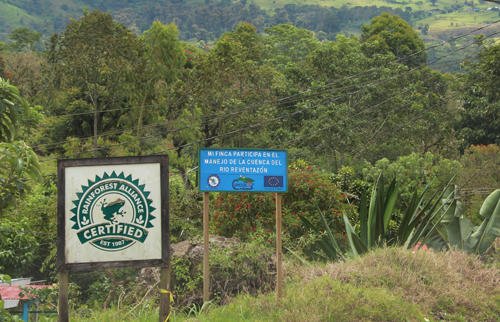Press and News The incompatibility of ecosystem-based agriculture with business thinking

A peek into the discussions about working with the private sector and ecosystem-based approaches to agriculture, from the 7th Annual Ecosystem Services Partnership Conference (ESP) in Costa Rica earlier this month.
Business is no place for magical thinking. There needs to be a very strong reason why a business would think about ecosystem services at all, let alone manage them. – Jeff Milder, Rainforest Alliance
So began the debate at the 7th Annual Ecosystem Services Partnership Conference (ESP) earlier this month in Costa Rica. The conference focused on 'Local action for common good', bringing together researchers from all over the world to share and discuss their work on how human beings benefit from nature, i.e. ecosystem services.
From quite early on, it became apparent that many useful ecosystem services-related theories, frameworks and findings were out there, but what actions and experiences on the ground have actually led to positive change?
Bioversity International, in collaboration with Ecoagriculture Partners and the CGIAR Research Program on Water, Land and Ecosystems, led a session on 'Ecosystem Services in Healthy Rural Landscapes' to focus on the contributions that are provided to agriculture from ecosystems, especially when ecosystems are sustainably managed at the landscape scale.
One presentation that particularly inspired further discussion in the room was by Jeff Milder from the Rainforest Alliance, sharing their experiences and results so far in product certification. The topic of working with the industry struck a chord with many, and repeatedly came up throughout the conference, perhaps highlighted more so, by the lack of private sector attendance at a predominantly scientific event.
But should this separation remain? The situation is complicated. On the one hand, researchers are skeptical of working with the private sector fearing reputational risk or a loss of scientific independence. Becoming overpowered by a business agenda is also a concern. One researcher from Argentina voiced the unfortunate experience of being discredited by agricultural input companies after having kindly invited them to a discussion with the government on the effects of pesticides on pollinators and invertebrates.
Industry is often seen as the corporate villain by conservation organizations, ecologists and the like. But more and more, researchers and governments are realizing that these big players cannot be ignored.
"There is a willingness and openness now to work with private companies that was not there 5-10 years ago. Having said that, areas of tension or conflict have to be discussed upfront and decided upon”, explained Jeff Milder.
Easier said than done? A farmer who was present mentioned their struggle to be part of a company's supply chain because of strict technical guidelines to guarantee produce quality. This doesn't leave much room or incentive for more ecosystem-based approaches, i.e. leveraging the biodiversity and ecosystem services available to farmers to create healthier and more sustainably productive farming.
A good number of cases does exist, however. Celia Harvey from Conservation International emphasized how "there will always be trade-offs, but we need to find as many win-win situations as possible".
And the industry is changing, albeit slowly. More companies are looking into sustainable sourcing and reducing their environmental footprint. Even though some companies implement this change "kicking and screaming because Greenpeace has launched a name-and-shame campaign against them", jokes Jeff.
There is a natural difficulty in convincing farmers, policymakers and companies to adopt more ecosystem-friendly approaches to agriculture. Ecosystem-based approaches are often time and knowledge-intensive, the benefits take longer to mature, and there are clear drivers such as agricultural subsidies and quick profits that feed less sustainable behaviour. Often there is also the perceived idea that ecosystem-based agriculture means more work and more regulation, even though many practices are cheap, local and low-tech. Farmers worry and ask "Who will pay for the transition period until the farm becomes as profitable as business-as-usual?"
That is a big issue. Farmers and large companies are still reaping enough from heavy input agriculture. The losses suffered do not yet outweigh the benefits. "I'd like to think that we do not need to wait for big disasters to happen in order to change though”, added Louise Willemen from Ecoagriculture Partners.
There is a recognition that policy and economic incentives have to change in order to make the investment worth it for the private sector. How to begin however, still needs to be better articulated.
Here are some current activities from presenters at the conference that might be of interest:
- BioProtection New Zealand - Biological controls
- Bioversity International - Agricultural ecosystems
- Conservation International - Ecosystem-based adaptation
- GEF/UNEP/FAO - Global Pollination Project
- Landscapes for People, Food and Nature Initiative - Business Working Group
- Rainforest Alliance - Sustainable Agriculture
- TEEB for Agriculture and Food
For the full list of speakers at Bioversity International's session, presentations and more information about the conference, please visit WLE’s conference page or search #espconf7 on Twitter and other social media.
